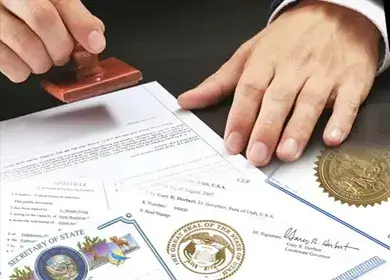Introduction

The demand for mutual recognition of documents beyond boundaries is rising in this age of globalization. There are two main approaches utilized to validate records for global objectives, they are Apostille and Legalization.
efinition of Apostille
Apostille meaning is a certificate that confirms the public origin of a record. It is an internationally acceptable approach that makes work more comfortable by facilitating the authentication method of documents planned for use in nations that pertain to the Hague Convention on Apostille.
efinition of Legalization
Defiant to Apostille, Legalization guides general methods showing a document in practice for cross-border usage. The process may vary from one nation to another, unlike the apostille handled by an international convention. Documents moving into countries that have not marked up for the Hague Apostille Convention are needed to be legalized.
istorical Context and Origin
The background to document legalization and authentication is old. It evolved from the requirement of conditions to have a system of identifying and validating foreign records. The Apostille Convention was launched in 1961 under the Hague Conference on Private International Law to create a document authentication approach between member nations.
Legalization vs. Apostille

Key Differences
One of the main disparities between apostille and legalization is their scope and recognition. Apostille is an arrangement or form of legalization that includes those nations incorporated in the Hague Apostille Convention. Contrarily, legalization is the wide and country-precise process that usually asks for documents proposed for non-member nations.


When to Choose Legalization
Which form to go, with apostille or by legalizing, relies on whether a destination country has confirmed the Hague Apostille Convention or not. Prejudice among these countries makes taking an apostille faster and easier in most cases.
Purpose of Apostille

Ensuring Document Authenticity
The preliminary goal of an apostille is to confirm the realism of one country’s general document for use in another member state. With the branch of an apostille certification, the competent sources ensure that the document is genuine and can be used abroad.
Simplifying International Document Recognition
Apostille service plays a crucial part in making the recognition of documents across nations more leisurely, which is often challenging and time-consuming. It reduces the need for comprehensive red-tapes, such as the bureaucracy needs for people and businesses transacting globally.
Legalization vs. Apostille
Though both authentications with legalization and apostille perform a common aim, apostille is meant exclusively for nations under the Hague Apostille Convention. Legalization, on the other hand, can be engaged in both convention and non-convention nations but may apply further processes.
Documents Eligible for Apostille

Types of Documents
Generally, apostilles involve public documents published by government agents. These contain birth certificates, matrimony licenses, notarized documents, court decisions, and other official papers.
Examples of Documents Requiring Apostille
General examples of documents for document authentication that often need Apostille include:
- Certificates of birth
- Matrimonial certificates
- Judgments in divorce
- Adoption certificates
- Documents which have been notarized
- Court judgments
Educational and Professional Certificates
Apostille may also be unrestricted for educational and professional certificates like diplomas, degrees, and professional ownership. It is the most significant when people examine for work or further studies beyond their nations.
Types of Documents Requiring Legalization


Personal Documents
Confidential documents such as powers of attorney, affidavits, and others that are not protected by the Hague Apostille Convention usually need legalization.

Educational Certificates
Academic certificates could be required to be legalized in non-convention countries that are not part of the Hague Apostille Convention. It is especially essential for people who want to enter education institutions in non-convention states.

Business and Commercial Documents
Legalization is crucial for business and commercial documents including certificates of incorporation contracts trade trade-associated documents. It benefits to assure their validity and approval by the destination nation.

Legal Documents
Global recognition may necessitate the legalization of legal papers containing court judgments. Consequently, this method generally entails verification of a document’s genuineness through diplomatic tracks.
The Legalization Process

Overview of Steps Involved
The legalization process typically involves several steps, including:
- Notarization
- Authentication
- Legalization
Designated Authorities
The designated leads answerable for the legalization procedure can vary from one nation to another. These authorities are government divisions or offices that affirm international documents.
Authentication and Verification
Verification of autographs and seals on the document that they are fair is what authentication is about. It is a method of assuring through diplomatic channels that the document is genuine, often through the consulate of the destination nation.
Apostille Process

Step-by-Step Guide
Compared to legalization, the Apostille process seems more streamlined:
- Requesting an Apostille
- Issuance of Apostille
- International Recognition
Document Verification
The Apostille service acts as a means of document verification which makes it easier for officials in the destination country to accept it as being real.
Fees and Processing Times
Regardless, fees and processing periods for Apostille may depend upon the issuing nation and kind of documents. In general, compared to wide and lengthy legalization approaches, Apostille tends to be faster and reasonable.
Frequently Asked Questions
1: The Hague Apostille Convention is a global treaty that facilitates the authentication of documents utilized abroad. Apostilles are agreed upon by member states as a universally determi3 ned mode of document certification to facilitate foreign transactions.
2: Opt for the apostille when you plan to use a document in a country that has approved the Hague Convention on Apostille. It is quicker and more direct than public legalization, which applies to non-convention states and takes more extended and complicated approaches.









